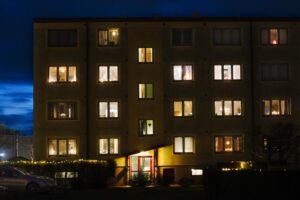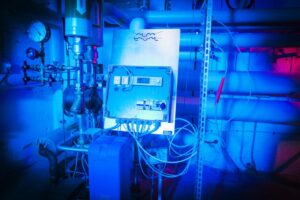 A unique combination of tried-and-tested hardware and cutting-edge software – in the form of a self-learning algorithm – is revolutionizing district heating in Sweden. Described as the district heating equivalent of a self-driving car, this solution has the potential to help significantly reduce carbon emissions in the energy-intensive domestic heating sector.
A unique combination of tried-and-tested hardware and cutting-edge software – in the form of a self-learning algorithm – is revolutionizing district heating in Sweden. Described as the district heating equivalent of a self-driving car, this solution has the potential to help significantly reduce carbon emissions in the energy-intensive domestic heating sector.
Last October was so wet in Ronneby, a medieval town in southern Sweden, that the autumn market – where locals normally stock up on apples, pumpkins and honey – had to be cancelled. In previous years, the rain would have had the phones ringing all day at the publicly owned housing company Ronnebyhus.
“Because of the humidity, you get a feeling that it’s cold, even though the thermometer says it isn’t,” explains Kristian Olsér, Ronnebyhus’ operations chief, as we walk out into the drizzle from one of the housing company’s apartment blocks. “The maintenance guys, the girls on reception, they get a lot of calls from people saying ‘it’s freezing’, and that they want the heat on.”
 This year the calls didn’t come. Olsér had instructed the IT company NODA, which installed its Smart Heat Building software in 50 of his buildings in November 2016, to boost indoor temperatures by a single degree for 30 days. The system, managed by a self-learning algorithm, then automatically calibrated the Alfa Laval IQHeat controllers in the buildings to meet the new goal, keeping Olsér’s customers warm and dry.
This year the calls didn’t come. Olsér had instructed the IT company NODA, which installed its Smart Heat Building software in 50 of his buildings in November 2016, to boost indoor temperatures by a single degree for 30 days. The system, managed by a self-learning algorithm, then automatically calibrated the Alfa Laval IQHeat controllers in the buildings to meet the new goal, keeping Olsér’s customers warm and dry.
Before NODA got involved, the risk of accidentally overheating apartments would have been too high. But NODA’s system is much better at fine-tuning than the most skilled energy manager. Olsér likens it to a self-driving car. “The telephone calls decreased a lot, and we saved time and money; if you have just one telephone call and send someone out, that costs you 1,500 Swedish kronor (€150),” he says.
Read the detailed story here
Source: Alfa Laval & NODA